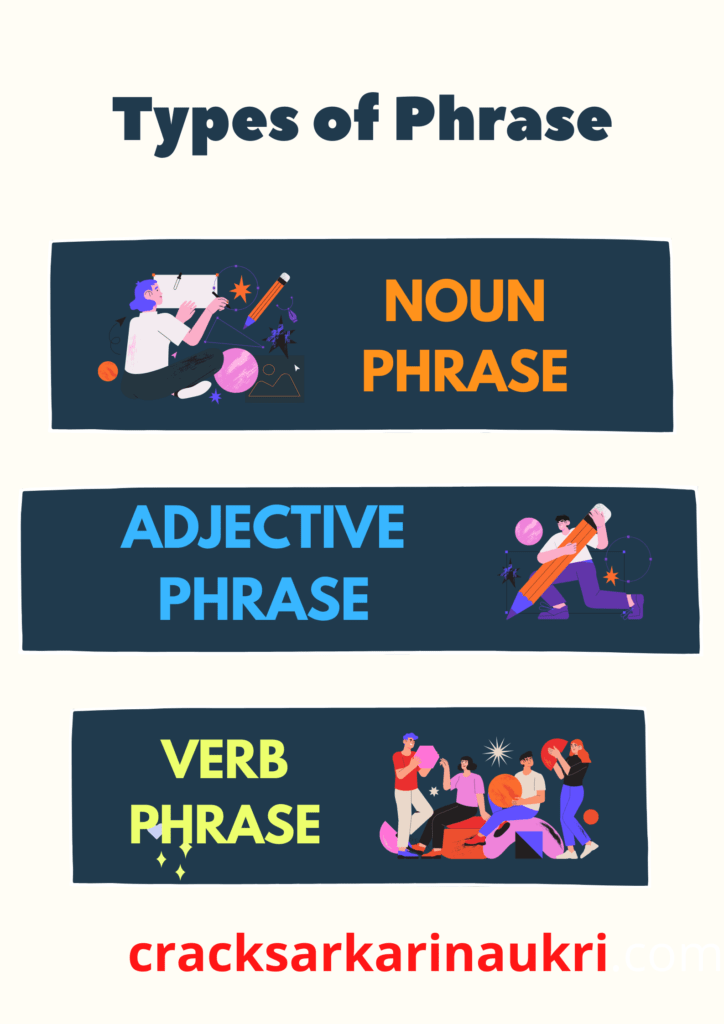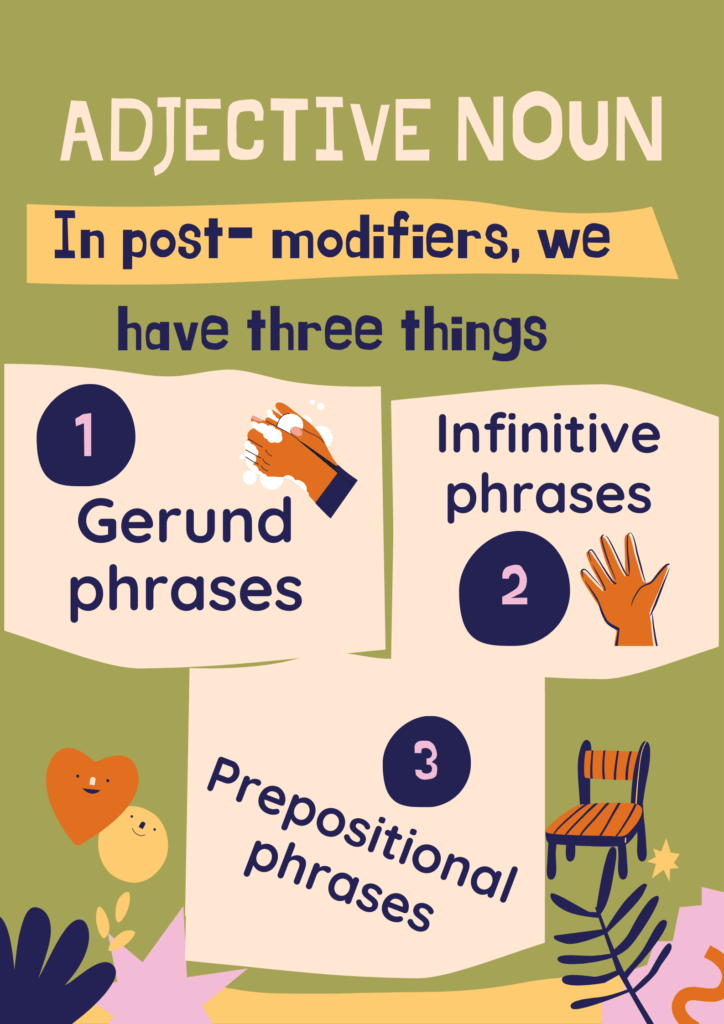What is a phrase, and what is a clause?
A phrase is a group of words without any subject-verb combination.
A subject-verb combination that makes a group of words is called a clause.
Both clauses and phrases are the building blocks of a sentence. Though they are a group of words, the main difference between them is a subject-verb combination.
Rita is sleeping on the floor.
Here you can see in the first group of words. We can find the subject-verb combination (Rita-subject, sleeping- verb). So we can this is a clause.
While on the other hand, “on the floor”, we can’t find any subject-verb combination, so we can say this is a phrase.
Let’s have another one :
Rahul is talking in the class.
Here on the first group of the word, we can find the subject-verb combination (Rahul-subject + sleeping-verb). So we’ll say this is a clause.
On the other hand, in the group of words “in the class,” we can’t find any subject-verb combination. So we’ll say this is a phrase of this sentence.
What is a Phrase?
Without a subject-verb combination that makes a group of words is called a phrase. It’s used as a single part of speech that can’t stand alone as a complete sentence.
It gives us some sense but cannot make any complete sense.
Let’s crake the definition into pieces-
- A phrase is a group of words.
- It’s doesn’t contain a subject-verb combination.
● It May have a subject but not any verb
● May have any verb but not any subject
● May have neither a subject nor a verb
- Used as a single part of speech
- It can’t stand alone as a complete sentence
- As their no subject-verb combination, though it gives some sense, not the absolute sense.
Examples of Phrases
Let’s understand with some examples:
On the table
See, the phrase, “on the table” is a group of a word. It gives us some idea that it’s something about the table, but it didn’t give us any clear idea. But when we said
The book is on the table.
Now it makes sense.
Let’s have another one:
Under the tree
If we only say “under the table”, we didn’t get any clear idea of what is under the table? Or who is under the table?
But when we say
The cat is under the table.
Now we can get a clear idea about the sentence. Here “under the table” became the phrase of the sentence.
1. Let’s have few more examples.
2. Children are making noise in the class
3. He is sleeping on the bed
4. Sun was rising over the horizon
5. Reha is sitting at the table.
Now is the concept of phrases is clear to you?
Types of Phrases

Now let’s see how many types of phrases are there.
There are mainly three types of phrases.
- Noun phrase
- Adjective phrase
- Verb phrase
Noun Phrase
A noun phrase is a phrase that acts or works as a noun in a sentence. A noun phrase is there to modify the head noun (the main noun or pronoun) and any dependent words (modifier) before or after the head.
Special information about Sir is given by the word dependent.

Now let’s see how many ways are there to form a noun phrase.
There are three ways to form a noun phrase-
- Pre-modifiers
- Post-modifiers
- Both pre and post-modifiers
Forming noun phrases using pre-modifiers
In pre- modifiers, we’ve three things
- Determiners
- Numbers
- Adjectives.
In determiners, we’ve four things- 1. Article (a, an, the) 2. Possessive adjectives (my, her, your, their, our etc.), 3. Distributive adjective (this, that, those, these etc.), 4. Quantifiers (some, my, a few, a lot of etc.).
Determiner + Noun
Our friends have bought a house in the village.
Here “our” is the determiner, and “friends” is the noun, and together they formed the noun phrase, “our friends”.
Those houses are costly.
Here “those” is the determiner and “houses” is the noun, and together they formed the noun phrase, “those houses”.
Adjective + Noun
Our closest friends have just bought a house in the village.
Here “closest” is the adjective, and “friends” is a noun, and together they formed the noun phrase, “closest friends”.
Determiner+Number+Adjective+Noun
These two good-looking boys are my cousins
Here “these” is the determiner, “two” is the number, “good-looking” is the adjective and “my cousins” is the noun.
Forming noun phrases using post- modifiers
In post- modifiers, we have three things-
1. Prepositional phrases
2. Gerund phrases
3. Infinitive phrases
Prepositional Phrases
The girl with no tantrums is the best.
Here “with no tantrums” is the noun phrase that’s modifying the noun “girl”.
The person in the black shirt is my friend.
Here “in the black shirt” is the noun phrase, modifying the noun “the person”.
Gerund Phrases
Before talking about gerund phrases, you’ve to know what precisely this gerund phrase is.
A gerund phrase starts with a gerund–ing form of a verb that acts as a noun in a sentence, modifies the noun, and gives more information about the noun.
Let’s have some examples.
The man standing next to you is my brother.
Here the noun “the man” is modified to the phrase “standing next to you”. So we can tell “the man standing next to you” is a noun phrase.
Three Infinitive Phrases
An infinitive phrase starts with an infinitive- ‘to +v1’ that acts as a noun and modifies the head noun.
He didn’t have any students to teach English.
Here “to teach English” is an infinitive phrase that acts as a noun, modifies the head noun “student”.
So here we can say “students to teach English” is our noun phrase.
[Note: Relative clauses – We also use relative clauses to modify any noun or noun phrase.]
The man who gave me some money died last night.
Here “who gave me money” is a relative clause with the relative pronoun “who”. The phrase “who gave me money” is a relative phrase that gives information about the head noun “the man”.
Forming noun phrases using both pre-modifiers and post-modifiers-
The girl talking with Rohan is my sister.
Here “the girl” is modified, and” talking to Rohan” is post-modifier.
So here, you can see we can form a noun phrase by using both pre-modifier and post-modifier.
Let’s have another one.
A tall guy who can fight
Here “a tall” is pre-modifiers, and “who can fight” is the relative clause that coming after the noun “guy”, whom we called post-modifier.
Adjective Phrase
An adjective phrase is a phrase- a group of words without the subject-verb combination that modifies a noun or a pronoun.
Let’s understand it in a better way with some examples.
- The movie was surprisingly good.
Here “surprisingly good” is the adjective phrase giving information about the noun movie by modifying the noun” film”.
Let’s have another one.
- She is a highly passionate girl.
- Here “highly passionate” is the adjective phrase that gives information about the noun “girl” by modifying it.
- Here “highly passionate” is the adjective phrase that provides information about the noun “girl” by changing it.
Verb Phrase
A verb phrase is nothing but a combination of an action verb and a helping verb (which is also known as an auxiliary verb).
Verbs that show or indicate any action are called action verbs.
Ex: go, cook, study, slap etc.
Helping verbs are the type of verbs that help or support the main verb of a sentence. As I already said, help verbs are also known as Auxiliary verbs.
These types of verbs include some forms like “to be”, “to have”, “to do”.
“To be”-is, am, are, were, is being, am being etc.
“To have”- has, have, had etc.
“To do”- do, does, did
“Moral auxiliary verb”- can, could, might, should, would, will, shall, must, ought to etc.
Now let’s have some examples to get a clear concept-
My mother has cooked food.
In this example, the verb phrase is “has cooked”. “Has” is the helping verb that supports the action verb “cook”. So they together formed a “verb Phrase”.
Did you get an idea about verb phrases? If not, let’s have another example.
He will help me to complete homework.
Here “will help” is the verb phrase. “Will” is the helping verb that supports the action verb “help”.
Now I think you got clear about what the verb phrase is.
Phrase and Idioms
An idiom is a group of words, just like phrases. They are almost alike, but there few differences that make phrases and idioms different. Let’s talk about those differences.
Let’s have some examples to understand better:
When we said once in a blue moon, it’s a phrase. As a phrase, it doesn’t have any meaning. We have to make a sentence to get clarity. But also by “once in a blue moon” doesn’t mean the person we are talking about is a blue moon, but we are talking about that they are rare to see.
So now you can understand the difference between phrases and idioms.
Any idiom can be a phrase, but any phrase can’t be an idiom.
For example, when we said “once in a blue moon”, we can get some symbolic significance though there’s no literal meaning.
But by the phrase ‘reading a book’, we get neither literal nor metaphorical meaning.
Let’s have some more examples of idioms and their actual meaning to understand better:
- Pull someone’ leg – To joke with someone.
- Speak of the devil – The person we are just talking about showed up!
- Live and learn- Make a mistake.
- Break the ice- Making people more comfortable.
I hope you got a clear idea about idioms and similarities or differences with phrases by those examples.
Phrases related to education
While speaking of phrases and idioms, we also used some famous sayings and expressions in our education which doesn’t have any literal meaning without a complete sentence but has a symbolic meaning.
Let’s have some examples:
- Copycat: someone who copies the work of others.
(Rohan is a copycat, doesn’t refer that he is a cat, it refers to that he copies someone’s work.)
- Play hooky – To skip school
- Drop out of school- stop attending school before completed.
- Put your thinking cap on- To think severely.
Phrases for kids
We used some phrases for kids while teaching them something. Let’s see what they are:
- Stop talking
- Don’t shout
- Use your mind
- Think about
- Watch carefully
These are the commonly used phrases and idioms used for kids.
Phrases related to health
Just like in education or case teaching kids, phrases also used while speaking of health and fitness.
Let’s see how they are related or how we use phrases and idioms naturally in the matters of health –
- An apple a day keeps the doctor away
- out of shape
- At death’s door
- Back on one’s feet
- Be on the Mend.
They’re the most commonly used phrases in the matter of health.
Inspirational phrases
We used some phrases to inspire that are called inspirational phrases.
Let’s have a look at some inspirational phrases _
- “strive to progress, not perfection.”
- “There are no shortcuts to any place worth going “- Beverly Sills
- “Successful and unsuccessful people do not vary greatly in their abilities.”
- “Don’t let what you cannot do interfere with what you can do.”
Frequently Asked Questions FAQ’s
Answer – The adjective is a word that tells you more about a noun or pronoun.
OR
The words which describe you about the quality of Noun or pronoun.
- A Black Dog.
- A tall lady.
- She is looking beautiful.
- A colourful rainbow.
- He is very honest.
- Suresh Raina is a Cricketer.
- Dhoni is talented person.
- Modi ji is great person.
- I have gold ring.
- Madhu is my best friend.
தினசரி தமிழ்நாடு வேலை புதுப்பிப்புகளுக்கான டெலிகிராம் குழுவில் சேரவும்
தினசரி அரசு மற்றும் தனியார் வேலை வாய்ப்பு செய்திகளுக்கு WhatsApp குழுவில் இணைந்து கொள்ளுங்கள்
Answer – Yes, a phrase can be formed with two words. Ex- “too slowly“, “watch TV”, “very happy” etc.
Recommended – How to become a master in Phrase and Clause
தினசரி தமிழ்நாடு வேலை புதுப்பிப்புகளுக்கான டெலிகிராம் குழுவில் சேரவும்
தினசரி அரசு மற்றும் தனியார் வேலை வாய்ப்பு செய்திகளுக்கு WhatsApp குழுவில் இணைந்து கொள்ளுங்கள்
- Bilkish is not as beautiful as Monika.
- I am as tall as my sister.
- Bikram is not as handsome as his father.
- They are as powerful as a king.
- This book is not so interesting as that.
- A cold drink is not more tasteful than coffee.
- That student was not more honest than Sohan.
- Ramu is as bad as Raman.
தினசரி தமிழ்நாடு வேலை புதுப்பிப்புகளுக்கான டெலிகிராம் குழுவில் சேரவும்
தினசரி அரசு மற்றும் தனியார் வேலை வாய்ப்பு செய்திகளுக்கு WhatsApp குழுவில் இணைந்து கொள்ளுங்கள்
Answer –
1. My teacher is a very helpful person.
2. Honesty is the best way to live happily.
3. He was awarded for his bravery.
4. He is absent due to illness.
5. She will defeat them.
6. She tried to control her anger.
7. We should not laugh at disabling a person.
8. Each human has a good side and an evil side.
9. Ego is the next step of disaster.
10. Her voice was full of anxiety.
Recommended – How to become a master of Abstract Noun 2.0?
தினசரி தமிழ்நாடு வேலை புதுப்பிப்புகளுக்கான டெலிகிராம் குழுவில் சேரவும்
தினசரி அரசு மற்றும் தனியார் வேலை வாய்ப்பு செய்திகளுக்கு WhatsApp குழுவில் இணைந்து கொள்ளுங்கள்
Answer –
- kind
- fear
- envy
- happy
- loyal
- ego
- grief
- excitement
- depressed
- Anger
- Forgiveness
- 12.hurt
- Laughter
- Justice
- worry
Recommended – How to become a master of Abstract Noun 2.0?
தினசரி தமிழ்நாடு வேலை புதுப்பிப்புகளுக்கான டெலிகிராம் குழுவில் சேரவும்
தினசரி அரசு மற்றும் தனியார் வேலை வாய்ப்பு செய்திகளுக்கு WhatsApp குழுவில் இணைந்து கொள்ளுங்கள்
Answer – The phrase is a group of words, can make some sense but not the whole meaning.
Recommended – How to become a master in Phrase and Clause
தினசரி தமிழ்நாடு வேலை புதுப்பிப்புகளுக்கான டெலிகிராம் குழுவில் சேரவும்
தினசரி அரசு மற்றும் தனியார் வேலை வாய்ப்பு செய்திகளுக்கு WhatsApp குழுவில் இணைந்து கொள்ளுங்கள்
Answer – You can identify a determiner depending on its relative position by checking the word which comes before a noun, not after, and any other adjectives that come before a noun.
தினசரி தமிழ்நாடு வேலை புதுப்பிப்புகளுக்கான டெலிகிராம் குழுவில் சேரவும்
தினசரி அரசு மற்றும் தனியார் வேலை வாய்ப்பு செய்திகளுக்கு WhatsApp குழுவில் இணைந்து கொள்ளுங்கள்
Answer – First, we need to find out the subject and verb of the sentence.
“Ram is diving into the pool.”
Here “Ram” is the subject, and “diving” is the verb. So “Ram is diving” is a clause, and the remains “into the pool,” as this doesn’t make any sense, is the phrase of this sentence.
Recommended – How to become a master in Phrase and Clause
தினசரி தமிழ்நாடு வேலை புதுப்பிப்புகளுக்கான டெலிகிராம் குழுவில் சேரவும்
தினசரி அரசு மற்றும் தனியார் வேலை வாய்ப்பு செய்திகளுக்கு WhatsApp குழுவில் இணைந்து கொள்ளுங்கள்
Answer – As we already get the idea about phrases and idioms, you can understand how important it is to learn them.
To learn idioms and phrases first, you should listen to them carefully then try to write them down each time you learned one. The most important part is to use them frequently in your talking.
Recommended – How to become a master in Phrase and Clause
தினசரி தமிழ்நாடு வேலை புதுப்பிப்புகளுக்கான டெலிகிராம் குழுவில் சேரவும்
தினசரி அரசு மற்றும் தனியார் வேலை வாய்ப்பு செய்திகளுக்கு WhatsApp குழுவில் இணைந்து கொள்ளுங்கள்
Answer – Yes, “every” is a determiner.
தினசரி தமிழ்நாடு வேலை புதுப்பிப்புகளுக்கான டெலிகிராம் குழுவில் சேரவும்
தினசரி அரசு மற்றும் தனியார் வேலை வாய்ப்பு செய்திகளுக்கு WhatsApp குழுவில் இணைந்து கொள்ளுங்கள்
Answer – Yes, Monday is a proper noun.
Also, Read (Recommended) – How to become a master of Proper Noun
தினசரி தமிழ்நாடு வேலை புதுப்பிப்புகளுக்கான டெலிகிராம் குழுவில் சேரவும்
தினசரி அரசு மற்றும் தனியார் வேலை வாய்ப்பு செய்திகளுக்கு WhatsApp குழுவில் இணைந்து கொள்ளுங்கள்
Answer –
- Cute
- Dangerous
- Dark
- Good
- Dead
- Bad
- Defeated
- Attractive
- Defiant
- Horrible
- Legendary
- Hungry
- Singular
- Hurt
- Irresponsible
- Ill
- Advisable
- Important
- Favourite
- Festive
தினசரி தமிழ்நாடு வேலை புதுப்பிப்புகளுக்கான டெலிகிராம் குழுவில் சேரவும்
தினசரி அரசு மற்றும் தனியார் வேலை வாய்ப்பு செய்திகளுக்கு WhatsApp குழுவில் இணைந்து கொள்ளுங்கள்
Answer – List of the degree of comparison
Positive Degree |
Comparative Degree |
Superlative Degree |
| active | more active | the most active |
| bad | worse | worst |
| beautiful | more beautiful | most beautiful |
| big | bigger | the biggest |
| black | blacker | the blackest |
| bright | brighter | the biggest |
| clean | cleaner | the cleanest |
| cleaver | cleverer | the cleverest |
| confused | more confused | the most confused |
| cruel | crueller | the cruellest |
| dark | darker | the darkest |
| difficult | more difficult | the most difficult |
| dirty | dirtier | the dirtiest |
| fascinating | more fascinating | the most fascinating |
| famous | more famous | the most famous |
| far | farther/further | the farthest/furthest |
| fast | faster | the fastest |
| fat | fatter | the fattest |
தினசரி தமிழ்நாடு வேலை புதுப்பிப்புகளுக்கான டெலிகிராம் குழுவில் சேரவும்
தினசரி அரசு மற்றும் தனியார் வேலை வாய்ப்பு செய்திகளுக்கு WhatsApp குழுவில் இணைந்து கொள்ளுங்கள்
Answer – Human Noun: Jonny, Joseph, Rakesh, Michael, Justin, Tonny, Bill gates, Tarzan, Mishka, Avinash, etc.
- Nation, religion, tribe, sect nouns: Japanese, Chinese, British, Russian, Canadian, German, Hindu, Muslim, African, American, Jain, Islamic, Buddhi, Christian, etc.
- Language Nouns: Chinese, French, Arabic, Japanese, Russian, Hindi, English, Urdu, Brazilian, Punjabi, Hungarian, Tamil, etc.
- City, District, Neighborhood, street: Washington DC, Cape Town, Oakland, Britain, Delhi, Mumbai, Shanghai, Tokyo, Dhaka, etc.
Also, Read (Recommended) – How to become a master of Proper Noun
தினசரி தமிழ்நாடு வேலை புதுப்பிப்புகளுக்கான டெலிகிராம் குழுவில் சேரவும்
தினசரி அரசு மற்றும் தனியார் வேலை வாய்ப்பு செய்திகளுக்கு WhatsApp குழுவில் இணைந்து கொள்ளுங்கள்
Answer – English determiners are words – such as a, an, the, each, every, etc. – that are used before nouns to signify their referents.
தினசரி தமிழ்நாடு வேலை புதுப்பிப்புகளுக்கான டெலிகிராம் குழுவில் சேரவும்
தினசரி அரசு மற்றும் தனியார் வேலை வாய்ப்பு செய்திகளுக்கு WhatsApp குழுவில் இணைந்து கொள்ளுங்கள்
Answer – A word that is used before a noun to show how the noun is being used, the effect the noun has, its meaning.
Read Full Details about Determiners – Click Here
தினசரி தமிழ்நாடு வேலை புதுப்பிப்புகளுக்கான டெலிகிராம் குழுவில் சேரவும்
தினசரி அரசு மற்றும் தனியார் வேலை வாய்ப்பு செய்திகளுக்கு WhatsApp குழுவில் இணைந்து கொள்ளுங்கள்
Answer – Five examples of phrases –
- Rain to stop ( she was waiting for the rain to stop)
- On the table (the book is on the table)
- To eat dinner ( he was existed to eat dinner)
- In the kitchen ( the dinner is in the kitchen)
- To be free ( he was so excited to be free from jail)
Recommended – How to become a master in Phrase and Clause
தினசரி தமிழ்நாடு வேலை புதுப்பிப்புகளுக்கான டெலிகிராம் குழுவில் சேரவும்
தினசரி அரசு மற்றும் தனியார் வேலை வாய்ப்பு செய்திகளுக்கு WhatsApp குழுவில் இணைந்து கொள்ளுங்கள்
Answer – Idioms and phrases are both groups of words. Phrases can’t stand alone without any sentence.
Idioms themselves have some symbolic meanings.
Recommended – How to become a master in Phrase and Clause
தினசரி தமிழ்நாடு வேலை புதுப்பிப்புகளுக்கான டெலிகிராம் குழுவில் சேரவும்
தினசரி அரசு மற்றும் தனியார் வேலை வாய்ப்பு செய்திகளுக்கு WhatsApp குழுவில் இணைந்து கொள்ளுங்கள்
Answer – A phrase is a group of words having no subject-verb combination.
Click Here – Phrase and Clause ! become a master of Phrase
தினசரி தமிழ்நாடு வேலை புதுப்பிப்புகளுக்கான டெலிகிராம் குழுவில் சேரவும்
தினசரி அரசு மற்றும் தனியார் வேலை வாய்ப்பு செய்திகளுக்கு WhatsApp குழுவில் இணைந்து கொள்ளுங்கள்
Answer – Determiners include articles (a, an, the ) demonstratives (this, that, those, these), pronouns, and possessive (My, your, our, its, his, her, their), quantifiers (Most, Much, More, little, less, etc.), Numbers (All, one, two.., enough, etc.) distributives (Each, every, either, neither, Both) interrogations (what, which, whose).
தினசரி தமிழ்நாடு வேலை புதுப்பிப்புகளுக்கான டெலிகிராம் குழுவில் சேரவும்
தினசரி அரசு மற்றும் தனியார் வேலை வாய்ப்பு செய்திகளுக்கு WhatsApp குழுவில் இணைந்து கொள்ளுங்கள்
Answer – Today, We will learn about 9 types of Adjectives that are mainly used in English Grammar.
- Proper Adjectives.
- Quantitative Adjectives.
- Quality Adjectives.
- Demonstrative Adjectives.
- Distributive Adjectives.
- Interrogative Adjectives.
- Possessive Adjectives.
- Numeral Adjectives.
- Descriptive Adjectives.
For Detailed Explanation with Example – Click Here
தினசரி தமிழ்நாடு வேலை புதுப்பிப்புகளுக்கான டெலிகிராம் குழுவில் சேரவும்
தினசரி அரசு மற்றும் தனியார் வேலை வாய்ப்பு செய்திகளுக்கு WhatsApp குழுவில் இணைந்து கொள்ளுங்கள்
Answer – I am going to tell you about 11 types of pronouns.
- Personal Pronoun
- Possessive Pronoun
- Demonstrative Pronoun
- Distributive Pronoun
- Reciprocal Pronoun
- Reflexive Pronoun
- Emphatic Pronoun
- Indefinite Pronoun
- Relative Pronoun
- Interrogative Pronoun
- Exclamatory Pronoun
For Read Pronoun and types of Pronoun in Detail – Click Here
தினசரி தமிழ்நாடு வேலை புதுப்பிப்புகளுக்கான டெலிகிராம் குழுவில் சேரவும்
தினசரி அரசு மற்றும் தனியார் வேலை வாய்ப்பு செய்திகளுக்கு WhatsApp குழுவில் இணைந்து கொள்ளுங்கள்
Answer – A proper noun is a specific name for any particular person, place, or things For example:-
- Rohan
- Washington
- American
- British
- Parker pen
Also, Read (Recommended) – How to become a master of Proper Noun
தினசரி தமிழ்நாடு வேலை புதுப்பிப்புகளுக்கான டெலிகிராம் குழுவில் சேரவும்
தினசரி அரசு மற்றும் தனியார் வேலை வாய்ப்பு செய்திகளுக்கு WhatsApp குழுவில் இணைந்து கொள்ளுங்கள்
Answer – A proper noun is a specific name for a particular place, person, organization, or thing. Proper nouns always begin with a capital letter, no matter where they have fallen in a sentence.
Also, Read (Recommended) – How to become a master of Proper Noun
தினசரி தமிழ்நாடு வேலை புதுப்பிப்புகளுக்கான டெலிகிராம் குழுவில் சேரவும்
தினசரி அரசு மற்றும் தனியார் வேலை வாய்ப்பு செய்திகளுக்கு WhatsApp குழுவில் இணைந்து கொள்ளுங்கள்
Answer – Those verbs which can not tell the whole meaning of a sentence without using an object are known as a transitive verb.
Examples of Transitive Verb
PM Modi addresses the nation today.
John gave the gift to his father.
He offers a job.
தினசரி தமிழ்நாடு வேலை புதுப்பிப்புகளுக்கான டெலிகிராம் குழுவில் சேரவும்
தினசரி அரசு மற்றும் தனியார் வேலை வாய்ப்பு செய்திகளுக்கு WhatsApp குழுவில் இணைந்து கொள்ளுங்கள்
Answer – The words by which it is known that some work is being done or the work is being done is called a verb. In simple terms, whatever the subject does, has done, or will do is called a verb.
தினசரி தமிழ்நாடு வேலை புதுப்பிப்புகளுக்கான டெலிகிராம் குழுவில் சேரவும்
தினசரி அரசு மற்றும் தனியார் வேலை வாய்ப்பு செய்திகளுக்கு WhatsApp குழுவில் இணைந்து கொள்ளுங்கள்
Answer – Nouns generally can differentiate in two ways- concrete nouns and abstract nouns.
Here is the list of some examples of abstract nouns:
Emotions/ Feelings
Anger
Anxiety
Depressed
Excitement
Grief
Helpful
Hate
Loyal
Human Characteristics
Ego
Envy
Honesty
Beauty
Brave
Confidence
Fear
Honour
Common Abstract noun
Truth
Thought
Poverty
Need
Peace
Opportunity
Peace
Reality.
Ans: nouns generally can differentiate in two ways- concrete nouns and abstract nouns.
Here is the list of some examples of abstract nouns:
Emotions/ Feelings
Anger
Anxiety
Depressed
Excitement
Grief
Helpful
Hate
Loyal
Human Characteristics
Ego
Envy
Honesty
Beauty
Brave
Confidence
Fear
Honour
Common Abstract noun
Truth
Thought
Poverty
Need
Peace
Opportunity
Peace
Reality.
Recommended – How to become a master of Abstract Noun 2.0?
தினசரி தமிழ்நாடு வேலை புதுப்பிப்புகளுக்கான டெலிகிராம் குழுவில் சேரவும்
தினசரி அரசு மற்றும் தனியார் வேலை வாய்ப்பு செய்திகளுக்கு WhatsApp குழுவில் இணைந்து கொள்ளுங்கள்
Answer – An abstract noun is the type of noun that cannot be felt with our 5 organs. We can only imagine and feel them in our imagination.
Recommended – How to become a master of Abstract Noun 2.0?
தினசரி தமிழ்நாடு வேலை புதுப்பிப்புகளுக்கான டெலிகிராம் குழுவில் சேரவும்
தினசரி அரசு மற்றும் தனியார் வேலை வாய்ப்பு செய்திகளுக்கு WhatsApp குழுவில் இணைந்து கொள்ளுங்கள்
Answer – Those verbs which do not need any object for complete meaning or sense is known as intransitive verbs.
Example – laugh, sing, jump, fly, etc.
தினசரி தமிழ்நாடு வேலை புதுப்பிப்புகளுக்கான டெலிகிராம் குழுவில் சேரவும்
தினசரி அரசு மற்றும் தனியார் வேலை வாய்ப்பு செய்திகளுக்கு WhatsApp குழுவில் இணைந்து கொள்ளுங்கள்
Answer – These verbs are helping the main verb. They mainly state the condition of the subject or object.
Examples – is, am, were, should be, etc.
தினசரி தமிழ்நாடு வேலை புதுப்பிப்புகளுக்கான டெலிகிராம் குழுவில் சேரவும்
தினசரி அரசு மற்றும் தனியார் வேலை வாய்ப்பு செய்திகளுக்கு WhatsApp குழுவில் இணைந்து கொள்ளுங்கள்
Answer – A Replacement of noun, is called pronoun. or A pronoun is a word used instead of noun.
Example – They are playing ludo.
She is my best friend.
I am her sister. etc.
தினசரி தமிழ்நாடு வேலை புதுப்பிப்புகளுக்கான டெலிகிராம் குழுவில் சேரவும்
தினசரி அரசு மற்றும் தனியார் வேலை வாய்ப்பு செய்திகளுக்கு WhatsApp குழுவில் இணைந்து கொள்ளுங்கள்
Answer – These main verbs mainly tell what the subject is doing, have done or wants to do.
Examples-
Write, laugh, work, run, etc.
Radha write a book.
She is laughing.
John works very fast.
Shreya runs one kilometre today.
தினசரி தமிழ்நாடு வேலை புதுப்பிப்புகளுக்கான டெலிகிராம் குழுவில் சேரவும்
தினசரி அரசு மற்றும் தனியார் வேலை வாய்ப்பு செய்திகளுக்கு WhatsApp குழுவில் இணைந்து கொள்ளுங்கள்
Answer – An adjective often comes BEFORE a Noun:
A White car.
A Blue sky.
An exciting Book.
Sometimes an adjective comes AFTER a Verb:
A Black toy.
A tall man.
A Blue Pen.
Sushma is an attractive girl.
தினசரி தமிழ்நாடு வேலை புதுப்பிப்புகளுக்கான டெலிகிராம் குழுவில் சேரவும்
தினசரி அரசு மற்றும் தனியார் வேலை வாய்ப்பு செய்திகளுக்கு WhatsApp குழுவில் இணைந்து கொள்ளுங்கள்
Answer – The verb and the subject must have the same person and number to make a sentence errorless. This is known as subject-verb agreement.
தினசரி தமிழ்நாடு வேலை புதுப்பிப்புகளுக்கான டெலிகிராம் குழுவில் சேரவும்
தினசரி அரசு மற்றும் தனியார் வேலை வாய்ப்பு செய்திகளுக்கு WhatsApp குழுவில் இணைந்து கொள்ளுங்கள்
Answer – ‘mine’ is a Possessive Pronoun which makes sense for sense rights.
Example – You are mine.
She is mine.
This pen is mine.
தினசரி தமிழ்நாடு வேலை புதுப்பிப்புகளுக்கான டெலிகிராம் குழுவில் சேரவும்
தினசரி அரசு மற்றும் தனியார் வேலை வாய்ப்பு செய்திகளுக்கு WhatsApp குழுவில் இணைந்து கொள்ளுங்கள்
Answer – All Articles, demonstratives, pronouns, and possessive, quantifiers, Numbers, distributives, interrogatives are Determiners.
தினசரி தமிழ்நாடு வேலை புதுப்பிப்புகளுக்கான டெலிகிராம் குழுவில் சேரவும்
தினசரி அரசு மற்றும் தனியார் வேலை வாய்ப்பு செய்திகளுக்கு WhatsApp குழுவில் இணைந்து கொள்ளுங்கள்
Answer – The adjective form of obey is willing to follow or obedient.
தினசரி தமிழ்நாடு வேலை புதுப்பிப்புகளுக்கான டெலிகிராம் குழுவில் சேரவும்
தினசரி அரசு மற்றும் தனியார் வேலை வாய்ப்பு செய்திகளுக்கு WhatsApp குழுவில் இணைந்து கொள்ளுங்கள்
Answer – अगर देखा जाये तो गोल्ड खुद में एक adjective है, क्युकी गोल्ड एक विशेष धातु है।
Example – This is Gold chain.
That is Gold watch.
ऊपर लिखे दोनों Examples में “Gold” chain और watch की विशेषता बता रहा है, परन्तु Gold का Adjective भी होता है। आइये इसे हम उदहारण से समझते है।
This is 24k Chain.
This is 22k watch.
ऊपर लिखे उदहारण में 24k और 22k “Gold” की शुद्धता या विशेषता बताने के लिए प्रयोग किआ गया है। अतः Gold का Adjective 10k, 18k, 22k, 24k इत्यादि हो सकते है।
தினசரி தமிழ்நாடு வேலை புதுப்பிப்புகளுக்கான டெலிகிராம் குழுவில் சேரவும்
தினசரி அரசு மற்றும் தனியார் வேலை வாய்ப்பு செய்திகளுக்கு WhatsApp குழுவில் இணைந்து கொள்ளுங்கள்
Our Recommended Posts
- DCPU Recruitment 2024 Apply For Supervisor, Assistant, Watchman Posts
- CMRL Recruitment 2024 Apply for General Manager Posts
- RPF Recruitment 2024 Apply For Sub Inspector and Constable Posts
- Madras High Court Recruitment 2024 Apply For Driver Posts
- Indian Post Office Karnataka Recruitment 2024 Apply for Staff Car Driver Post
- NIRT Recruitment 2024 Apply For Project Driver and Mechanic Posts






